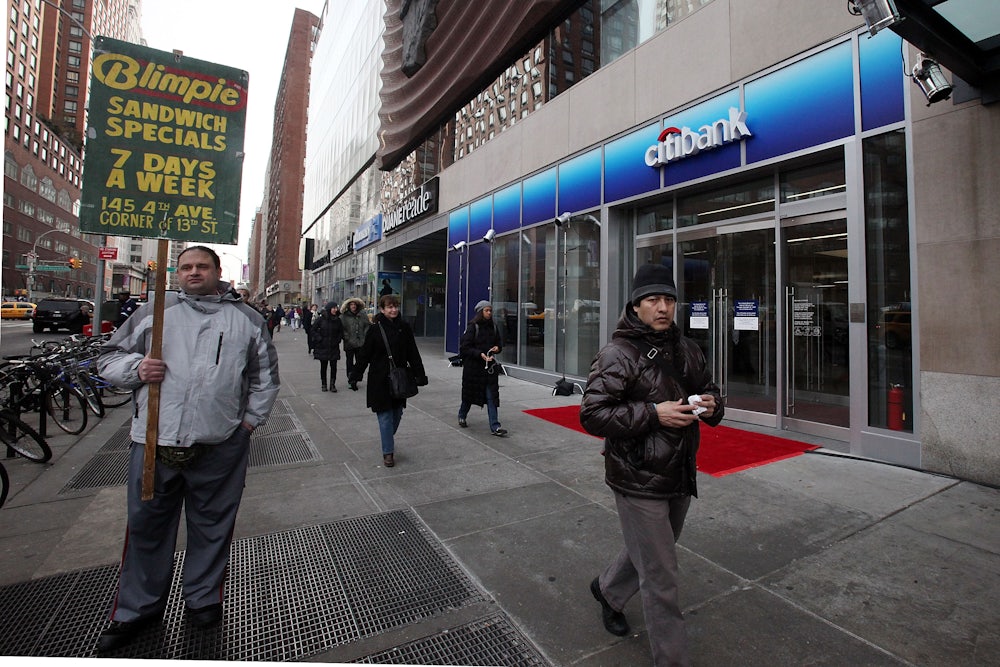In 2005, long before Occupy Wall Street, the publication of Thomas Piketty’s Capital in the Twenty-First Century, or Bernie Sanders’s bid for the presidency, Citigroup released a report that outlined the transformation of the United States into a highly unequal “plutonomy,” in which money and power were concentrated in the hands of a very few people at the top. But rather than sounding an alarm, the report was only meant to advise investors on how better to take advantage of the trend. Since the rich had all the money and were therefore disproportionately driving consumer spending, Citigroup’s recommendation to investors was, as Bloomberg summarized it, “Buy the stuff rich people like.”
Fifteen years and a Great Recession later, plutonomy appears to be showing some signs of wear. Economic inequality hasn’t diminished, but working people fed up with stagnant wages and their own declining standard of living while Wall Street flourishes have increasingly challenged the free-market consensus of prior decades. Over the last few years, a swell of populist, if not quite anti-capitalist, sentiment has upended elections in the U.S. and Europe, and even conservative politicians have been forced to acknowledge wide-scale downward mobility. “No one is ready for this new world,” Ajay Kapur, one of the authors of the 2005 Citigroup report, told Bloomberg last summer.
That could be one reason why Citigroup and a number of other big banks now appear eager to rehabilitate their reputations, which suffered a serious blow after their various financial manipulations were unearthed during the 2008 financial crash. Banks’ early-2000s greed—and legislators’ willingness to overlook it—paved the road to the last recession, and now, in the midst of yet another serious downturn, several financial institutions seem to be rebranding as social justice–minded, through a series of nominally progressive new initiatives. But while Citigroup, Bank of America, Wells Fargo, and others may be launching fresh programs to combat racial and economic inequality, when it comes to the big banks, their recent acts of charity feel less like atonement—let alone justice—and more like a case of destroying the world with one hand while doling out crumbs with the other. It’s the disease trying to package itself as the cure.
Earlier this week, Citigroup—fresh off naming its first woman CEO—announced that it was pledging over $1 billion to help close the racial wealth gap. In a new report, Citigroup estimated that the persistence of racial inequality had cost the economy as much as $16 trillion. To help ameliorate long-standing disparities, the bank said, it would put $550 million toward increasing homeownership among people of color, among other measures. “We believe we have a responsibility to address current events and to frame them with an economic lens in order to highlight the real costs of longstanding discrimination against minority groups, especially against Black people and particularly in the U.S.,” Citigroup economists said in a statement.
But the problem with Citigroup’s portrayal of today’s racial wealth gap as the product of an ambient and all-encompassing “systemic” racism is that it obfuscates its own role in perpetuating and widening that very gap. Citigroup had a notoriously heavy hand in inflating the housing bubble that led to the foreclosure crisis; like a number of other banks in the years prior to the Great Recession, it engaged in predatory lending to home buyers, particularly Black and Latinx families, and sold securities backed by risky mortgages to investors.
As the People’s Policy Project has pointed out, the housing crash that resulted from banks playing fast and loose with subprime mortgages decimated Black wealth and led to a twentyfold increase in the percentage of Black homeowners with negative equity—that is, Black homeowners who owed more on their mortgages than their houses were worth. (Citigroup’s racial wealth gap report unsurprisingly doesn’t have much to say about this phenomenon.) Though Citi was eventually fined by the Justice Department and ordered to pay out $2.5 billion in “consumer relief,” that relief came in the form of financing apartments for rent, rather than helping those who had lost their homes get them back. “Citi will end up bringing in rents from people who used to own homes,” Cornell law professor Robert Hockett told NPR at the time of the settlement. “That’s cold comfort.”
The same troubling relationship to the last crash underlies a recent charity drive by Wells Fargo, which rolled out a number of food banks at its branches in partnership with the organization Feeding America this summer. While a program to provide 50 million meals during a time of increased food insecurity sounds urgent enough, Wells Fargo, like the other big banks, essentially set fire to middle-class wealth in the years before the Great Recession through risky lending to home buyers and the sale of dubious mortgage-backed securities. In 2017, The Hill further found that Wells Fargo had spent $46.7 million lobbying federal lawmakers to ease consumer protections between 2009 and 2016, or right when the bank was opening millions of fraudulent accounts under customers’ names in order to meet inflated sales goals. Distributing some low-cost meals, then, is a relatively cheap price to pay for a public relations boost just as working people are again getting squeezed.
On Wednesday, Citigroup’s outgoing CEO, Michael Corbat, stated, “Addressing racism and closing the racial wealth gap is the most critical challenge we face in creating a fair and inclusive society.” But if recent history is any indication, his bank is more an obstacle to that fair and inclusive society than it is a righteous vehicle for it. And after all, when the economy tanked in 2008, the banks were famously rewarded for their collusion in the disaster with a financial bailout. The last thing they deserve in this moment is a reputational one.
